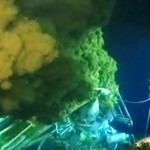The Case for Drilling Close to Home
 The Gulf oil spill makes it clear that the ecology and economy would have been far safer if oil drilling was done in shallower coastal waters or on land. But political expediency and a fear of offending environmentalists has prevented this.
The Gulf oil spill makes it clear that the ecology and economy would have been far safer if oil drilling was done in shallower coastal waters or on land. But political expediency and a fear of offending environmentalists has prevented this.
With no apparent solution to capping the massive oil rupture in the Gulf of Mexico, questions are being asked about ultra-deep offshore drilling.
Why not inshore drilling instead of at 5, 000 feet when there is no technology, no precedent or know-how to cope with an “accident” of that intensity at that depth?
It’s reasonable only to blame BP because it’s a BP site. But no one -- not BP, Exxon, Gulf, any big oil company, nor the Army Corps of Engineers, nor the enlightened President himself has any workable solution to stop the seemingly perpetual gushing of an estimated million gallons of crude oil a day that is defiling Gulf waters, destroying wildlife, ravaging jobs, and has no cure. Not even a viable plan in sight.
Charles Krauthammer, arguably America’s most insightful political columnist, wonders why oil drilling takes place in populated areas where “fishing, shipping, tourism, recreation” flourish, instead of remote wildernesses, like the Arctic, where devastating spills aren’t so devastating – given that all spills are serious, and are always going to happen.
It’s a fair question.
Krauthammer and others also wonder why environmentalists are escaping blame for the BP disaster. It’s mostly environmentalists who have forced oil drilling away from coastal areas into the ultra-deep parts of the ocean where, if something goes wrong, no one knows how to fix it. In BP’s case, there seems to have been no contingency plans, and rather casual safety precautions.
And now the U.S. government is looking into criminal charges against BP – the hunt for a scapegoat is on. With shares dropping, the question now is whether BP will survive.
But blaming isn’t solving. If this oil spill continues into August, until other wells are drilled to relieve the pressure, the disaster may well be beyond calculation.
Interior Secretary Ken Salazar doesn’t inspire confidence when he opines that BP’s failure to cap the leak indicates that some other agency should take over the capping job. But which agency? Who? BP is arguably one of the world’s experts at deep sea drilling, and none are more capable of stopping or controlling the “rupture” than BP.
Coast Guard Admiral Thad Allen has wryly noted that it’s fine to push BP’s efforts aside, but what is there to replace them with? That’s the big question.
Looking back, the ecology and economy would have been far safer if oil drilling was done in shallower coastal waters, or on land. But political expediency intruded to prevent that. So an apparently incurable disaster is the result of politically correct policies. Thanks, guys, for your contribution to disaster.
And then there is the Arctic and the Alberta tar sands, which seem benign in comparison to the devastation in the Gulf.
It can’t be comfortable for President Barack Obama these days. It was his administration that gave BP an environmental exemption to drill last year, so the longer the disaster continues, the more the buck will be passed and fingers will be pointed at Washington.
In the foreseeable future there seems no way to curtail the need for oil. But future drillings should ensure that there are contingency plans for inevitable accidents. Also, drilling should be encouraged in environments where accidents can be contained – even if they are on land or in coastal waters, and offend environmentalists.